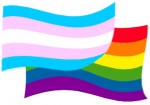2016 turned around with reviews of what a good year it had been for trans awareness. Films, soaps, celebrities, parliamentary inquiries, public debates all made it seem like a breakthrough in awareness. Most of us would say that hatred and exclusion are the result of ignorance, sometimes willful. As more is said and seen about what it means to have (what is currently termed) gender dysphoria, surely ignorance will decline?
One can understand that when someone prominent transitions, they are snapped up by the media and made a spokesperson. That gives rise to backlash from more ordinary and struggling trans people, who don’t feel represented by someone more privileged and earlier on in the issues to be faced. So we accept that the celebrities make very public mistakes, which can damage as much as help the rest of us. But when the UK parliamentary Women and Equalities Committee presented its formal report on transgender services and equality to the UK Parliament, informed by 260 witnesses, it was criticised in just the same way as being a waste of resources for responding to such a minority interest.
It seems most people still prefer to regard being transgender as a curable psychological disorder, and that because only one per cent of the population experience it, it should be ignored rather than understood. Certainly, treatment on the NHS should be excluded, because it’s just pandering to a lifestyle choice. Fix my leg, broken by skiiing, but don’t fix this person’s hormones or body. Well, to that I say: you too are in a minority because you can afford to have ski holidays, whereas we are called a ‘lobby group’ with an agenda, though we cannot choose. You are free to join a minority, we just happen to share a minority condition, however non-minority the rest of our lives are. And we can choose to go skiing too, so we can be in the same minority together … so long as only our legs get fixed.
Where ignorance and closed minds lead
I don’t think we are a lot nearer social acceptance just because there is greater awareness. It isn’t about minorities really, it’s about a particular kind of minority. In all this growing awareness, there remains a lot of fear and intolerance. This week, I am as equally sickened by Richard Littlejohn writing in the Daily Mail (whose 2013 writing contributed to the suicide of Lucy Meadows), as by The Archbishop of Canturbury’s crocodile tears over LGBT attitudes among his African prelates. It was Christian missionary colonialism that imported homophobia into Africa in the first place, and protecting those who support or condone imprisonment or execution of people on grounds of sexuality, on the self-defined assertion that it is a sinful lifestyle choice, diminishes this powerful presence in the world to a weak and self-serving institution. I am as sickened by The Channel 4 interview (hardly a debate) between Jack Monroe and Dr Julia Long. It was like placing one scientist representing consensus over anthropogenic climate change against a single prominent denialist, as if the argument were balanced. The view by Dr Julia Long, that every transgender person represents a rape threat to ‘real’ women wherever they go, espoused and promoted repeatedly by Germaine Greer, is also rehearsed in The Conservative Woman (TCW) by Emily Watson, who writes: ‘it opens the door to potential sex offences. By opening single sex facilities up to the opposite sex, women are put at risk. Women have a real fear of being sexually assaulted or raped by men, and the sensible ones avoid places or occasions where they could be in danger. Women feel able to let their guard down with other women.’ She supports her case by a single criminal case of a rapist and an incident in a novel. (TCW is a right-wing conservative, Christian fundamentalist ‘family’ group.)
It is the classic statement: being transgender does not exist; some men like to dress up and pretend, and all of them are predatory. Trans women aren’t women; they are men, because god makes only men and women. We are dangerous. I am dangerous. We threaten civilisation and its norms. We challenge ideas of gender, but by identifying as male or as female, we support the patriarchy. And even acceptance of gender dysphoria is dangerous to children, so stop it!
Are we a million miles from anti-gay laws and condoned homophobia? I sometimes don’t think we’ve moved anywhere at all except in circles, the central anchor-point of which is Judeo-Christian religious.
It’s all about sex
Those of us disadvantaged by a birth condition have become regarded as a dangerous lobby of rapists. It’s all about sex. Innit? Just because a man could, if he wished, put women’s clothes and make-up on, with the sole intent of invading ‘women’s spaces in order to molest or rape, transgender women are all placed under suspicion of being sexual predators. So every woman in a burkha or niqab could similarly be a male rapist in disguise. This all echoes the idiocy in the USA of all those who would almost insist on examining the genitals of anyone ambiguous (child or adult) before entering gendered lavatory facilities. Cis women have been thrown out of female facilities for looking too male, and it escapes attention that bearded and testosterone-fuelled trans men having to enter female facilities would be absurd. (Testosterone-fuelled does not mean potential rapist any more than oestrogen-fuelled trans women, but it does highlight the absurdity.) Especially when everyone goes home to share a common toilet with all genders of their family and friends. And because more sexual violence occurs in familiar domestic circumstances than in public faciltities and venues. And because rape by transgender women is almost unknown.
Being transgender has nothing to do with sex, let alone coercive sex.
Becoming undangerous
There are many things about me that are minority. I play the trumpet. I write poetry. I own a flat. I have three university degrees. None of these places me in the category of lobby group or having an agenda, though each confers certain rights and marks me out as different. But these things are safe. (Well, the decibel rating of a trumpet may not be, and should I be writing politically sensitive poetry in China, that would not be.) They are also personal choices based on innate abilities. None causes me distress, and I am sensitive about the trumpet in the flat. Life is peaceful, you are safe, I am safe.
But any day I can read people online who go out of their way to make untrue assertions against my condition, that may lead others to fear me, disadvantage me or attack me. Living in Brighton, I am lucky. I can choose not to read hate, and I know it will always exist, and I live inconspicuously in a tolerant place. But many others are not so safe. How do we become undangerous, when we are treated as we are, so obviously, in social and broadcast media? When we transition and return from that traumatic passage in life back to ordinariness, we don’t all want to be labelled forever as trans. Only this week one person I know through social media said ‘Now that I am a year post-surgery, I am no longer trans’. Another said ‘I’m fed up with this; I don’t want any labels.’ A government minister came out as gay this week, and the point was raised: ’why does anyone need to come out any more?’ Being trans makes coming out unavoidable, but after that, many of us are done with it. We become able simply to live as we feel right. I have struggled with ‘being out’ in order to be an encouragement, when I feel I’ve said all there is to say, and just want to live inconspicuously. But then I feel hurt to read another person deny my experience, and add a reply to another Guardian comment trail …
One per cent of the population is quite a lot of people, and if we were all completely visible and getting on with our lives, perhaps we would seem less dangerous. But why should we be visible? It isn’t our lives’ mission to educate the world. Against us, is the propensity to cite the extreme, the singular. Whether quoting a celebrity transitioner, or a long-discredited piece of research, a criminal case, or a prominent ‘detransitioner’, the negative (like consumer dissatisfaction) is re-quoted many times more than the positive. I would like to see a headline like this instead:
NHS spends £17m per annum on gender care, including £4.5m on surgery, and saves £80m in social costs of mental health, impact on emergency services, loss of employment productivity and welfare benefits!
(I’m not sure about the £80m, because no-one has measured it, but if half of young people and a third of older trans people are suicidal, the on-costs for all of us must be surely in this order.) But I don’t think one is coming any time soon.
What really will make a difference, is when everyone who knows someone like me actively stands up for us, and refuses to accept the misguided hatred, the subtle discrimination, the careful sidelining, the nudge and the ‘understanding’ wink. If there really are about 650,000 of us in the UK, and we each have fifteen people willing to actively diffuse ignorant comments and jokes, that’s nearly ten million people making our lives safer.
So, dear Anglican Church, dear Pope, dear politicians, academics and experts. Dear journalists, panelists, and public debaters. Dear comedians, writers and critics. Dear family, friends and colleagues. When you hear or read someone declaiming people like me as potential sexual predator, rapist, subversive and moral disaster, speak up, speak out – not to me in my safe spaces, but where it may also cost you that cocked eyebrow, mild shock and surprise. Because every time you play safe and self-protective, you make it harder for us to lively safely and normally.

